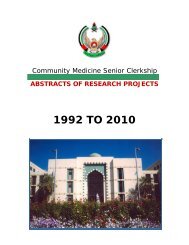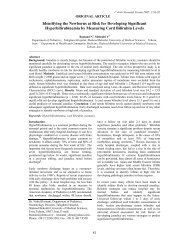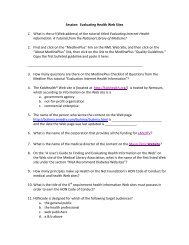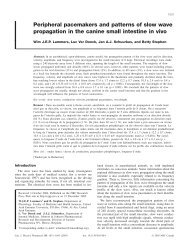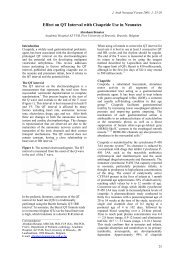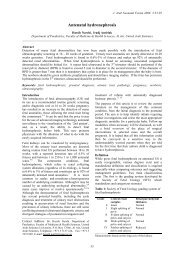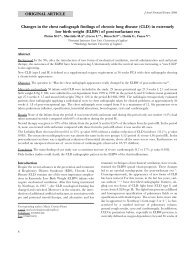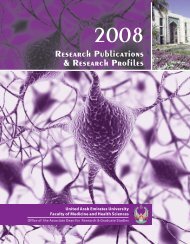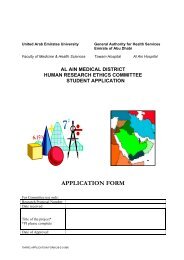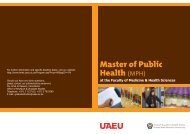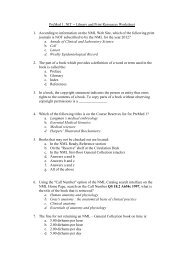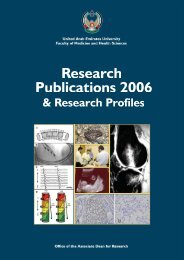Research Publications - College of Medicine and Health Science
Research Publications - College of Medicine and Health Science
Research Publications - College of Medicine and Health Science
You also want an ePaper? Increase the reach of your titles
YUMPU automatically turns print PDFs into web optimized ePapers that Google loves.
44<br />
Pr<strong>of</strong>essor & Chair<br />
Pr<strong>of</strong> Basel al-Ramadi<br />
Pr<strong>of</strong>essor<br />
Pr<strong>of</strong> S Dissanayake<br />
Pr<strong>of</strong> T Pal<br />
Pr<strong>of</strong> T A Rizvi<br />
Associate Pr<strong>of</strong>essor<br />
Dr G Khan<br />
Assistant Pr<strong>of</strong>essor<br />
Dr A Al-Qahtani<br />
Dr M Al-Shamsi<br />
Dr A Sonnevend<br />
Medical <strong>Research</strong> Specialist<br />
Ms L M Ali<br />
Ms A Al-Ghazawi<br />
Mr A Al-Haj<br />
Ms M Ibrahim<br />
Ms P S Philip<br />
Mr A Shahin<br />
Medical <strong>Research</strong> Technician<br />
Ms G Bashir<br />
Medical Secretary<br />
Ms M Dawood<br />
Office Assistant<br />
Mr H Mohammed<br />
Department<br />
<strong>of</strong> Microbiology<br />
<strong>and</strong> Immunology<br />
<strong>Research</strong> Pr<strong>of</strong>ile<br />
The research interests <strong>of</strong> members <strong>of</strong> the<br />
Department <strong>of</strong> Medical Microbiology &<br />
Immunology span from studies into the<br />
molecular mechanism <strong>of</strong> bacterial <strong>and</strong> viral<br />
pathogenesis to investigating the underlying<br />
molecular <strong>and</strong> cellular mechanisms by which<br />
the immune system functions in health <strong>and</strong><br />
diseases.<br />
The Department is involved in teaching<br />
undergraduate medical students as well<br />
as graduate students in the MSc <strong>and</strong> PhD<br />
programs. Currently, there are four PhD <strong>and</strong><br />
four MSc students in our program. Three more<br />
MSc students graduated from the program in<br />
2011.<br />
Pr<strong>of</strong>essor Basel al-Ramadi<br />
The functional characterization <strong>of</strong> the innate immune system <strong>and</strong><br />
its role in disease has been the focus <strong>of</strong> research in our laboratory<br />
for the past few years. Although this system was initially<br />
thought to be simple in how its components function, the data<br />
from many laboratories demonstrate quite the opposite. It turns<br />
out that the innate immune system is at the center <strong>of</strong> many<br />
hitherto unexplained phenomena. These include, for instance,<br />
how adjuvants used in human vaccines actually work <strong>and</strong> why<br />
diseases like type I diabetes is now thought <strong>of</strong> as a chronic inflammatory<br />
condition. The innate immune system is at the heart<br />
<strong>of</strong> the many sequelae <strong>of</strong> human obesity, now collectively known<br />
as the metabolic syndrome. Work in our laboratory demonstrated<br />
a direct role for the Toll-like receptor pathway in maintaining self<br />
tolerance. This is the default pathway that prevents individuals<br />
from reacting against their own tissue, thereby averting the<br />
development <strong>of</strong> autoimmune diseases. Thus, animals deficient<br />
in MyD88 protein, a central regulator <strong>of</strong> Toll-like receptor path-



